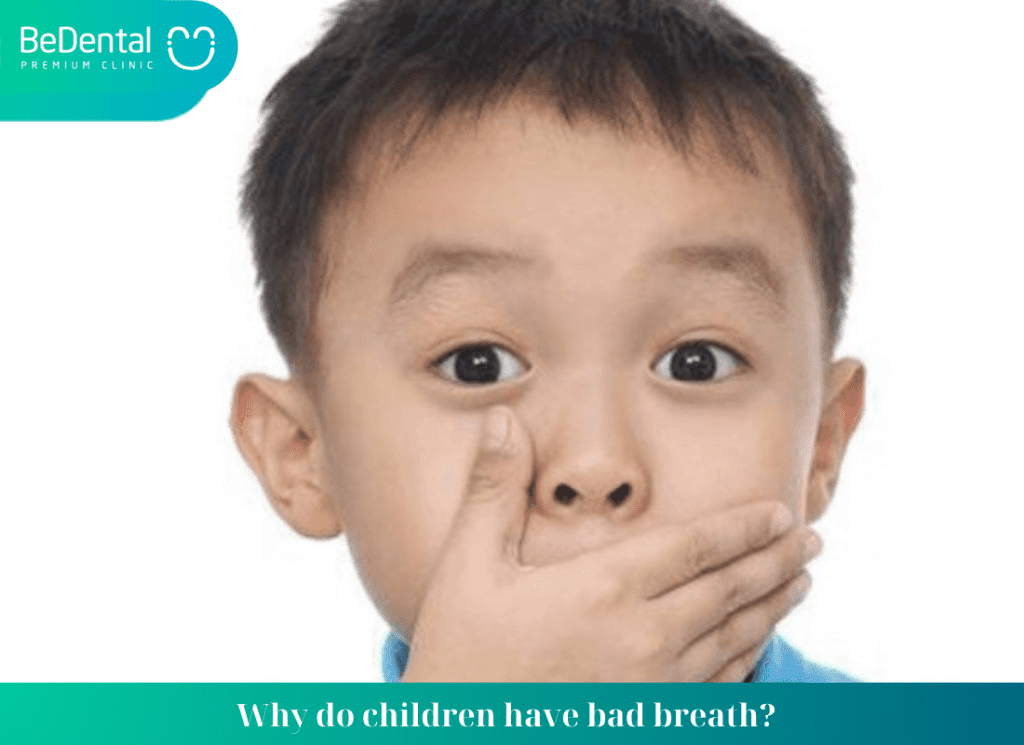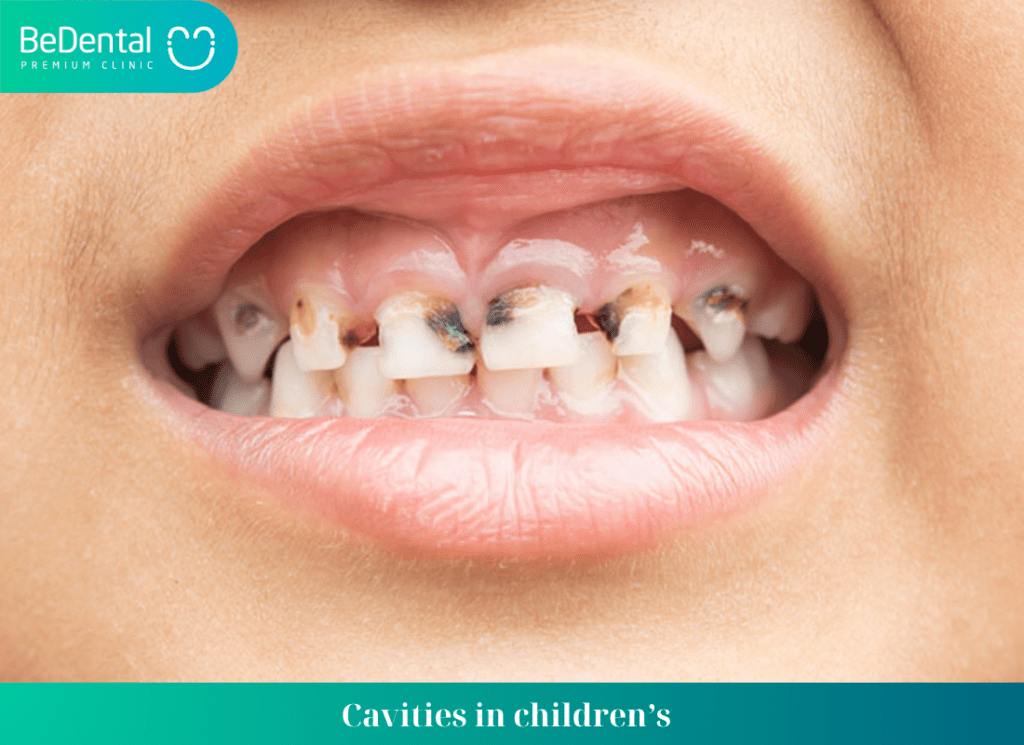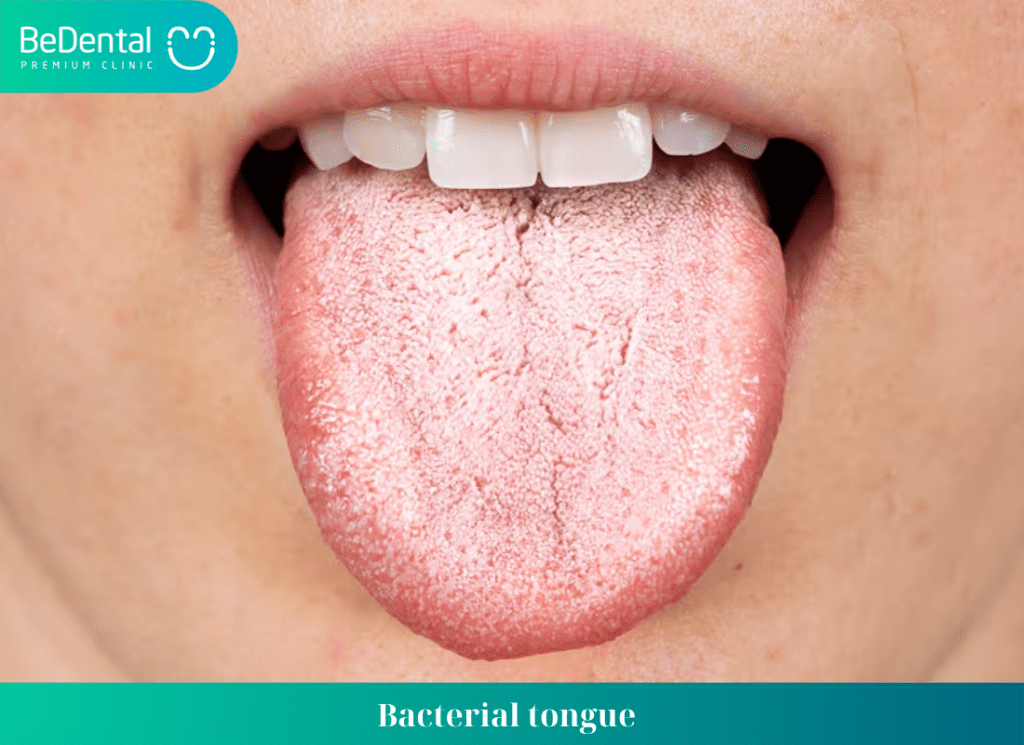Bad breath is a common condition in children that often confuses many parents. Bad breath can occur temporarily or it can be a sign of oral or systemic diseases. Let’s find out why do children have bad breath? Other reasons that cause a child’s mouth to smell bad.
What is bad breath in children?
Bad breath in children (also known as bad breath in young children) is the phenomenon of foul odor coming from the mouth of a child under the age of 12. Bad breath in children can cause unpleasant odors and may make a child feel embarrassed when communicating with others. This is a common issue and although it does not threaten the life of the child, it should still be considered and addressed to ensure the child’s living environment and oral health.
Why do children have bad breath?
Why do children have bad breath? Bad breath in children can be caused by various reasons, so finding the exact cause can sometimes be complex. Here are some common reasons that may cause bad breath in children:
- Firstly, due to bacterial plaque: One of the common causes of bad breath is bacterial plaque buildup in the mouth. When a child does not brush their teeth or rinse their mouth regularly, bacterial plaque will grow and decompose quickly, creating an unpleasant odor.
See more: The process of root canal treatment
- Secondly, due to dry mouth: Children may have poor habits or not drink water regularly, leading to bad breath. Dry mouth is an ideal condition for bacteria to grow and produce bad breath.
- Diet: Unhealthy eating habits and consuming foods with strong odors such as garlic, onions, chili, seafood, etc., can also contribute to bad breath

- Oral health issues: Mouth problems such as cavities, gum inflammation, tonsillitis with pus in the mouth can also be reasons why children have bad breath.
- Thumb sucking or putting objects in the mouth: Children may have the habit of sucking their thumbs or putting objects in their mouths, creating a favorable environment for bacteria to grow and cause bad breath.
Allergies or oral diseases: Some children may have allergies or oral diseases such as gum inflammation, mouth ulcers, or a yellow tongue, which can also cause bad breath.
To limit and prevent bad breath in children, it is necessary to adhere to proper oral hygiene practices, avoid consuming foods that cause bad breath, and maintain a healthy lifestyle. If a child’s bad breath does not improve after following oral hygiene methods, it is advisable to consult a doctor or dentist for further evaluation and advice.
See more: What is teeth tightening during braces?
What is the condition that causes bad breath in children?
What is the disease of bad breath in children? The main cause of a child’s bad breath is the release of sulfur compounds from gram-negative bacteria residing in the child’s mouth (tonsils, saliva, gums, or cavities). These compounds have a foul odor because they easily vaporize.
Bad breath in children due to dietary habits
A child’s bad breath may be a temporary condition caused by certain “odor-producing” foods the child consumes. Foods rich in protein (such as red meat, seafood, cheese, etc.) break down in the mouth when chewed, producing some compounds, including sulfur compounds, causing the child’s mouth to smell bad. A low carbohydrate diet can also be a cause of bad breath in children.
Some strongly scented foods such as onions, garlic, or spices containing high levels of sulfur are absorbed into the blood after consumption and gradually excreted through the lungs, causing bad breath when breathed out.
Temporary bad breath due to food will disappear after a while when the child practices good oral hygiene.
Children’s bad breath related to oral diseases
Poor oral hygiene: Incorrect oral hygiene leads to food residues accumulating in between teeth and gums, on tooth surfaces, or in between teeth, creating conditions for microorganisms in the mouth to develop and cause unpleasant breath.
Oral hygiene plays a crucial role in eliminating mouth odor, even when the child’s teeth first emerge. Children should start brushing their teeth as soon as their first milk teeth come in. As the child grows, they need to develop the habit of brushing their teeth and maintaining daily oral hygiene.
- Dry mouth: Dry mouth is a common cause of a child’s bad breath. Dry mouth can result from mouth breathing, which can cause nasal congestion in children, or from mouth breathing while sleeping, or from thumb sucking or putting toys in the mouth. Dry mouth creates conditions for microorganisms to grow and cause bad breath in children. Therefore, to address this issue, parents need to teach children to breathe through their nose completely, discourage thumb sucking, and encourage children to drink an adequate amount of water daily.
- Cavities: Cavities are a common condition in children that can cause bad breath when teeth are not properly brushed or when the diet lacks carbohydrates. The condition of cavities can only be improved when the child receives treatment for cavities combined with regular and proper oral hygiene.
- Gum disease: In addition to cavities, gum disease is also a common condition of inflammation in the mouth. Plaque buildup on teeth, if not removed or removed improperly, can cause gum inflammation and lead to bad breath in children.

- Other oral infections: Conditions such as gum inflammation leading to ulcers, gum abscesses, etc., or tooth impaction due to Candida fungal infections in the mouth can also cause a child’s mouth to smell bad.
- Jawbone inflammation: Bad breath can also be the result of conditions such as gum inflammation, jawbone inflammation, or bone necrosis.
- Misaligned bite: Misaligned teeth can create spaces between the teeth where cavities can develop, leading to a more serious case of bad breath.
- Oral tumors: Oral tumors that cause ulcers and bleeding can be a rare cause of bad breath in children.
See more: Harmful effect of smoking while wearing braces
Other diseases causing bad breath in children
- Foreign objects in the nose: Curiosity may lead children to put foreign objects in their noses. These objects may not fall into the digestive or respiratory tract but can get stuck in the nose, causing nasal congestion and bad breath.
- Adenoid/tonsil diseases: Food particles can accumulate in the crevices of the adenoids/tonsils, especially in children with pus-filled tonsillitis or adenoid hypertrophy, leading to bad breath.
- Respiratory diseases: Conditions such as nasal inflammation, sinusitis, asthma, or respiratory failure can cause bad breath in children.
- Digestive diseases: Unpleasant-smelling breath in children may be a sign of gastroesophageal reflux disease, Helicobacter pylori-induced gastric ulcers, etc.
- Other chronic diseases: Diabetes, kidney failure, liver disease, etc., can also cause bad breath in children.
Other causes of bad breath in children
In addition to the causes mentioned above, there are several other reasons that can also cause bad breath in children. Below are some other reasons for bad breath in children:
- Sinusitis: Sinusitis can be a cause of bad breath in children. When the sinuses are inflamed and infected, it can lead to mucus dripping down the throat and causing a foul smell from the mouth.
- Diarrhea: Children with diarrhea may lose water, leading to bad breath. Dry mouth is an ideal environment for bacteria to grow and cause bad breath.
- Stomach diseases: Stomach issues such as gastritis or other stomach diseases can also cause bad breath.
- Bacterial tongue: Some children may have a bacterial-coated tongue or a tongue coating attacked by bacteria, causing bad breath.

- Allergies or respiratory issues: Allergies or respiratory problems such as tonsillitis, sinusitis, or allergic rhinitis can cause bad breath in children.
- Medication or vitamin with bad odor: Some types of medication or vitamins can cause bad breath in children.
To determine the specific cause of bad breath in children, it is advisable to take the child to see a doctor or dentist for a more accurate diagnosis. Identifying the cause will help find the appropriate treatment to reduce bad breath in children.
What can be done to improve bad breath in children?
To address bad breath in children, you can implement proper mouthwash and oral hygiene practices. Here are some suggestions to help reduce bad breath in children:
- Brushing teeth properly: Encourage children to brush their teeth at least twice a day with fluoride toothpaste. Choose a toothbrush suitable for the child’s age and mouth size to clean all areas of the mouth thoroughly.
- Rinsing mouth after eating: After each meal, encourage children to rinse their mouths with clean water or diluted saltwater to remove plaque and leftover food.
- Drinking plenty of water: Encourage children to drink plenty of water every day to minimize dry mouth, reducing the risk of bad breath.
- Limiting foods with strong odors: Reduce consumption of foods with strong odors like garlic, onions, chili, seafood, etc., to reduce bad breath after eating.
- Changing eating habits: Encourage children to stop biting their nails or using objects in their mouths to reduce the accumulation of bacteria causing bad breath.
- Treating oral health issues: If a child has any dental cavities or gum inflammation, it is necessary to take the child to the dentist for examination and treatment.
- Comprehensive health check-up: If bad breath does not improve after implementing the above measures, consult a dentist for an overall health assessment of the child.
Remember to be patient and monitor the child while implementing oral hygiene practices. If bad breath persists or worsens, seek help from a dentist or pediatrician to address the issue.
Preventing bad breath in children
To prevent bad breath in children, you can implement proper oral hygiene practices and provide appropriate oral care for the child. Here are some ways to prevent bad breath in children:
- Brushing teeth properly: Teach children to brush their teeth at least twice a day using fluoride toothpaste and choose a toothbrush suitable for the child’s age and mouth size.
- Rinsing mouth after eating: Encourage children to rinse their mouths after each meal with clean water or diluted saltwater to remove plaque and leftover food.

- Drinking plenty of water: Encourage children to drink plenty of water every day to minimize dry mouth and reduce the risk of bad breath.
- Limiting foods with strong odors: Avoid eating foods with unpleasant odors like garlic, onions, seafood, etc., to reduce bad breath after meals.
- Encourage eating a variety of foods: Encourage children to eat a variety of nutritious and healthy foods, rich in fiber, to maintain good oral health.
- Regular dental check-ups: Take children to see the dentist regularly for oral health check-ups and cleaning. The dentist can also provide advice on how to maintain proper oral hygiene for children.
- Avoid bad habits: Encourage children to stop biting their nails or putting objects in their mouths to reduce the buildup of bacteria causing bad breath.
- Treat oral health issues: If a child has any dental cavities or gum inflammation, take them to the dentist for treatment and improvement of oral health.
- Regular health check-ups: Have children undergo regular comprehensive health check-ups to diagnose and treat any oral, throat, or respiratory health issues early.
See more: Tips for eliminating bad breath
Remember to be patient and monitor the child while using oral hygiene products. If you have any concerns about your child’s bad breath, seek help from a dentist or pediatrician to address the issue.
Bedental has answered questions about why children have bad breath, what causes bad breath in children, how to prevent bad breath in children, and other possible reasons for a child’s mouth to have an odor in the previous article. If you still have questions, visit the nearest specialist to find answers!
Tư vấn chuyên môn bài viết:
BÁC SĨ DƯƠNG THỊ THÙY NGA
BEDENTAL - TOP STANDARD DENTISTRY SYSTEM
In HANOI
Address 1: 7B Thi Sach St, Ngo Thi Nham, Hai Ba Trung Dist, Ha Noi. - 0934.61.9090
Address 2: No 129 Hoang Ngan, Yen Hoa, Cau Giay Dist, Ha Noi. - 0934.61.9090
In HO CHI MINH
Address 1: 53 -55 -57 Pho Duc Chinh St, Nguyen Thai Binh, Dist. 1, Ho Chi Minh. - 0766.00.8080
Working: 9am - 8pm everyday
Website: https://bedental.vn/en/





